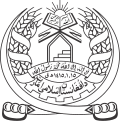| Date promulgated | Description | Text/quote | Ref. |
|---|
| 7 September 2021 | Appointment of caretaker cabinet led by Hasan Akhund. | | [6] |
| 7 September 2021 | Outlines policies of the Islamic Emirate following announcement of new Islamic government and cabinet. | | [6] |
| 3 December 2021 | Outlines the civil rights of women, including marriage and property rights, and instructs the Ministry of Hajj and Religious Affairs, the Ministry of Information and Culture, the Supreme Court, and provincial and district governors to implement them. | | [7] |
| 11 January 2022 | Creates a Kandahar ulama council to address provincial issues. In reality Akhundzada has since been consulting it on matters of national importance. | | [8] [9] |
| 3 April 2022 | Bans the production of opium and all other narcotics. | | [10] |
| 7 May 2022 | Orders women to only leave their homes when necessary, and to fully cover their bodies when they do, preferably with a burqa, and approves punishments for male guardians of women violating the order. | | [11] |
| 20 May 2022 | Bans Taliban members from taking multiple wives. | | [12] |
| 22 June 2022 | Announces death toll of the June 2022 Afghanistan earthquake and orders response efforts. | | [13] |
| 21 July 2022 | Bans criticism of the regime (referred to euphemistically as "false accusations"). | | [14] |
| 4 August 2022 | Nullifies the 1964 Constitution of Afghanistan and the 2004 Constitution of Afghanistan. | | [15] |
| 13 November 2022 | Orders judges to implement corporal punishments for all Hudud and Qisas offenses. | | [16] [17] |
| 11 January 2023 | Creates Ulema councils in 13 provinces to manage local issues. | | [18] |
| 22 January 2023 | Appointment of Mohammad Esa Thani as Acting Minister of Public Works. | | [19] |
| 29 January 2023 | Appointment of Hanif Abada as Chief of Police of Ghor Province and Qari Gul Haider as Deputy Governor of Ghazni Province. | | [20] |
| 18 March 2023 | Prohibits the cultivation of hemp and cannabis and orders the Ministry of Interior Affairs to bring violators to court. Mandates the destruction of crops and orders courts to punish violators. | | [21] |
| 19 March 2023 | Prohibits government officials from hiring relatives. Applies retroactively so that any relatives already hired must be fired. | | [22] |
| Orders destruction of all seized drugs and alcohol and the tools used to make them, and orders punishment of producers and sellers. Directs the Ministry of Interior Affairs, the General Directorate of Intelligence, and the Ministry of Public Health to implement the order before the courts. | | |
| 19 April 2023 | Eid al-Fitr message. Outlines codes of conduct for judges and security forces. | | [23] |
| 17 May 2023 | Temporary appointment of Abdul Kabir as Acting Prime Minister of Afghanistan while Hasan Akhund was recovering from an illness in Kandahar. Hasan Akhund returned to Kabul on 17 July. | | [24] [25] |
| 4 July 2023 | Bans hair and beauty salons, effective in one month. | | [26] |
| 28 December 2024 | Ban on windows in buildings occupied by women. Owners of affected buildings with existing windows are ordered to cover them, and authorities are instructed to monitor construction sites to prevent violations. | | [27] |
| 9 January 2025 | Appointment of Abdul Kabir as Acting Minister for Refugees and Repatriation, and dismissal from his post as Acting Deputy Prime Minister. | | [28] [29] |
| 20 January 2025 | Exit ban and arrest warrant for Sher Mohammad Abbas Stanikzai. | | [30] [31] |
| 27 January 2025 | Dismissal of Acting Deputy Foreign Minister Sher Mohammad Abbas Stanikzai and appointment of Naeem Wardak to the position. Appointment of Suhail Shaheen to Wardak's post as head of the Qatar embassy. | | [32] |
| 15 August 2025 | Appointment of Hassan Akhund as Prime Minister on a permanent rather than acting basis. The same applies to other members of the Akhund cabinet as well. | | [33] [34] |
| 29 September 2025 | Verbal decree ordering Afghanistan Telecom Regulatory Authority to indefinitely shut down fiber-optic communication nationwide with the goal of causing an internet blackout. | | [35] [36] |
| 13 October 2025 | 15 appointments to ministerial, provincial, and military positions | | [37] |
